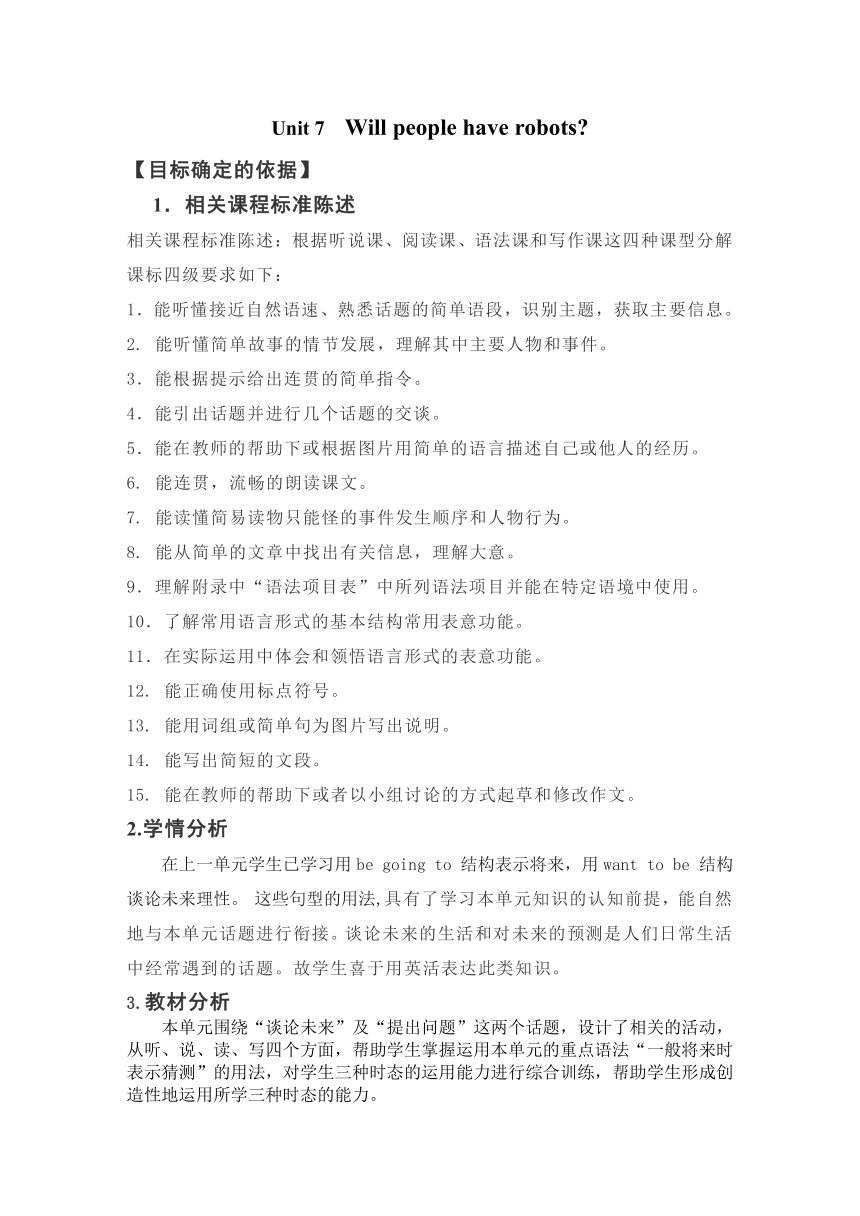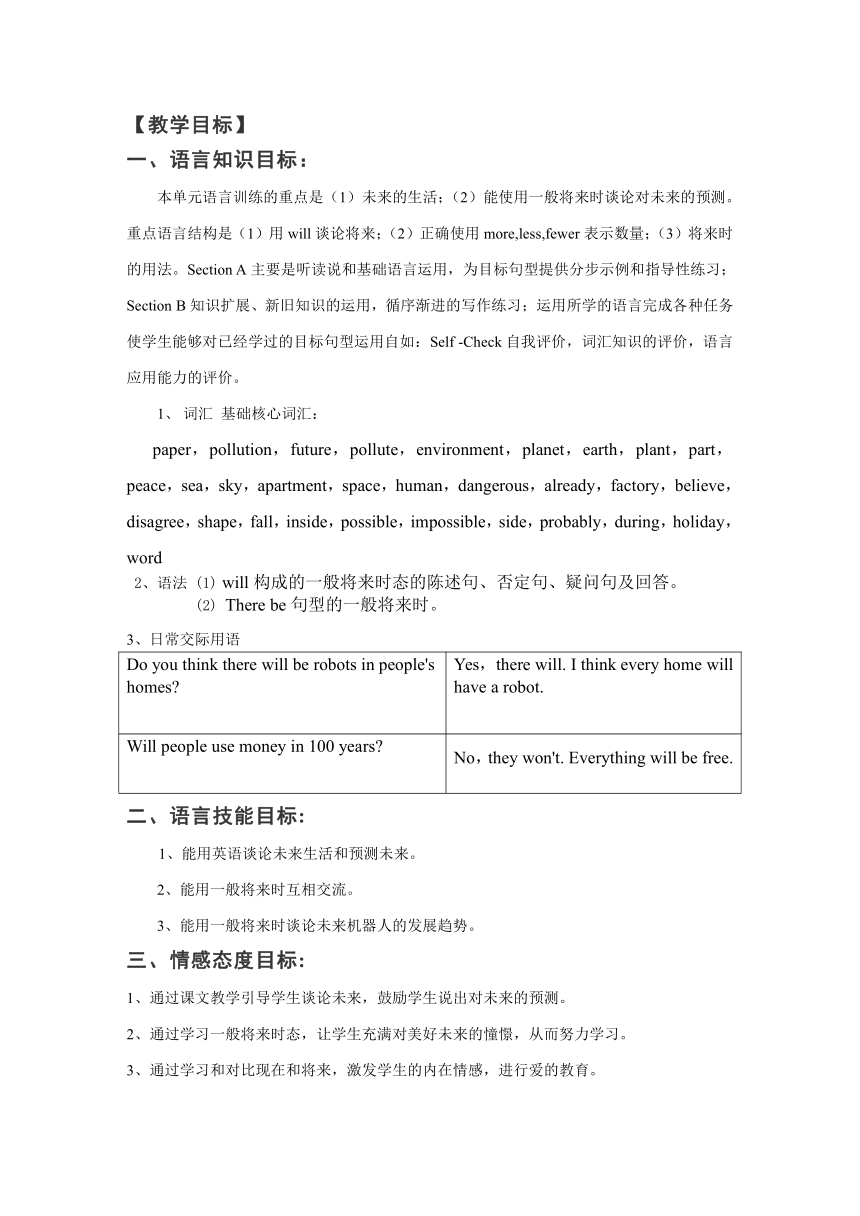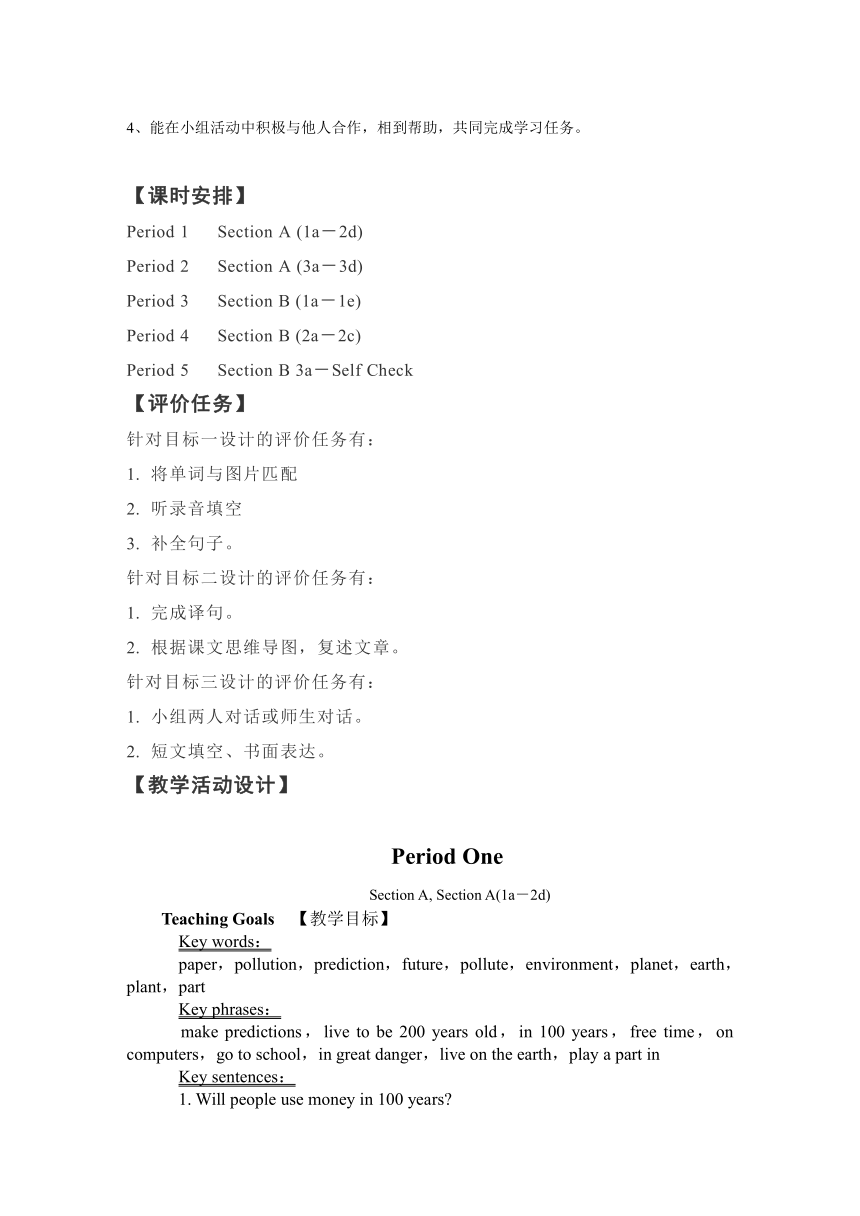人教版八年级上册Unit 7 Will people have robots?Section A 教案
文档属性
| 名称 | 人教版八年级上册Unit 7 Will people have robots?Section A 教案 |  | |
| 格式 | zip | ||
| 文件大小 | 77.1KB | ||
| 资源类型 | 教案 | ||
| 版本资源 | 人教新目标(Go for it)版 | ||
| 科目 | 英语 | ||
| 更新时间 | 2023-01-19 18:09:09 | ||
图片预览



文档简介
Unit 7 Will people have robots
【目标确定的依据】
1.相关课程标准陈述
相关课程标准陈述:根据听说课、阅读课、语法课和写作课这四种课型分解课标四级要求如下:
1.能听懂接近自然语速、熟悉话题的简单语段,识别主题,获取主要信息。
2. 能听懂简单故事的情节发展,理解其中主要人物和事件。
3.能根据提示给出连贯的简单指令。
4.能引出话题并进行几个话题的交谈。
5.能在教师的帮助下或根据图片用简单的语言描述自己或他人的经历。
6. 能连贯,流畅的朗读课文。
7. 能读懂简易读物只能怪的事件发生顺序和人物行为。
8. 能从简单的文章中找出有关信息,理解大意。
9.理解附录中“语法项目表”中所列语法项目并能在特定语境中使用。
10.了解常用语言形式的基本结构常用表意功能。
11.在实际运用中体会和领悟语言形式的表意功能。
12. 能正确使用标点符号。
13. 能用词组或简单句为图片写出说明。
14. 能写出简短的文段。
15. 能在教师的帮助下或者以小组讨论的方式起草和修改作文。
2.学情分析
在上一单元学生已学习用be going to 结构表示将来,用want to be 结构谈论未来理性。 这些句型的用法,具有了学习本单元知识的认知前提,能自然地与本单元话题进行衔接。谈论未来的生活和对未来的预测是人们日常生活中经常遇到的话题。故学生喜于用英活表达此类知识。
3.教材分析
本单元围绕“谈论未来”及“提出问题”这两个话题,设计了相关的活动,从听、说、读、写四个方面,帮助学生掌握运用本单元的重点语法“一般将来时表示猜测”的用法,对学生三种时态的运用能力进行综合训练,帮助学生形成创造性地运用所学三种时态的能力。
【教学目标】
一、语言知识目标:
本单元语言训练的重点是(1)未来的生活;(2)能使用一般将来时谈论对未来的预测。重点语言结构是(1)用will谈论将来;(2)正确使用more,less,fewer表示数量;(3)将来时的用法。Section A主要是听读说和基础语言运用,为目标句型提供分步示例和指导性练习;Section B知识扩展、新旧知识的运用,循序渐进的写作练习;运用所学的语言完成各种任务使学生能够对已经学过的目标句型运用自如:Self -Check自我评价,词汇知识的评价,语言应用能力的评价。
1、 词汇 基础核心词汇:
paper,pollution,future,pollute,environment,planet,earth,plant,part,peace,sea,sky,apartment,space,human,dangerous,already,factory,believe,disagree,shape,fall,inside,possible,impossible,side,probably,during,holiday,word
2、语法 (1) will构成的一般将来时态的陈述句、否定句、疑问句及回答。
(2) There be句型的一般将来时。
3、日常交际用语
Do you think there will be robots in people's homes Yes,there will. I think every home will have a robot.
Will people use money in 100 years No,they won't. Everything will be free.
二、语言技能目标:
1、能用英语谈论未来生活和预测未来。
2、能用一般将来时互相交流。
3、能用一般将来时谈论未来机器人的发展趋势。
三、情感态度目标:
1、通过课文教学引导学生谈论未来,鼓励学生说出对未来的预测。
2、通过学习一般将来时态,让学生充满对美好未来的憧憬,从而努力学习。
3、通过学习和对比现在和将来,激发学生的内在情感,进行爱的教育。
4、能在小组活动中积极与他人合作,相到帮助,共同完成学习任务。
【课时安排】
Period 1 Section A (1a-2d)
Period 2 Section A (3a-3d)
Period 3 Section B (1a-1e)
Period 4 Section B (2a-2c)
Period 5 Section B 3a-Self Check
【评价任务】
针对目标一设计的评价任务有:
1. 将单词与图片匹配
2. 听录音填空
3. 补全句子。
针对目标二设计的评价任务有:
1. 完成译句。
2. 根据课文思维导图,复述文章。
针对目标三设计的评价任务有:
1. 小组两人对话或师生对话。
2. 短文填空、书面表达。
【教学活动设计】
Period One
Section A, Section A(1a-2d)
Teaching Goals 【教学目标】
Key words:
paper,pollution,prediction,future,pollute,environment,planet,earth,plant,part
Key phrases:
make predictions,live to be 200 years old,in 100 years,free time,on computers,go to school,in great danger,live on the earth,play a part in
Key sentences:
1. Will people use money in 100 years
2. People will live to be 200 years old.
3. There will be fewer trees and the environment will be in great danger.
Teaching Key Points 【教学重点】
The vocabulary:
paper,future,pollute,pollution,environment,part,in 100 years,in great danger,play a part in
Target language:
Will people use money in 100 years?No,they won't. Everything will be free. Will people live to be 200 years old?Yes,they will. What's your prediction about the future?I think there will be more pollution.
Teaching Difficult Points 【教学难点】
1.will构成一般将来时态的句式。
2.“There be…”sentence structure in future tense.
3. more,fewer,less的用法。
4. How to make predictions.
Teaching Aids 【教学工具】
An English textbook,a tape recorder,CAI or courseware.
Teaching Steps 【教学过程】
Step 1 Leading in
Greetings. Welcome to Unit 7.Please turn to Page 49.In this unit,we'll make predictions about future. Can you guess what will happen in 100 years?Collect students' answers and say something about their predictions. For example,I think people will live to be 200 years old. With the development of technology,people will get healthier food and better medical care.
Step 2 Pre-task
Page 49,1a.
1.Look at the picture:How will the world be different 100 years from now?We're going to talk about sth. in 100 years.
2.Read each prediction to the class. Explain the new vocabulary.
3.Read the instructions. Make sure Ss know what they should do.
4.Do it by themselves.
5.Talk about the answers with the class.
Explain:一般将来时态
构成:will/be going to+动词原形
Page 49,1c.
1.Pay attention to the dialogue.
2.Read the dialogue fluently.
3.Pair-work. Work in pairs to make predictions according to the sample.
4.Ask several pairs to share their conversations to the class.
Step 3 While-task
Page 49,1b.
1.Practice reading the six predictions.
2.Read the instructions to Ss. Circle the things you hear on the recording.
3.Play the tape twice.
4.Play the tape a third time. At the same time,check the answers.
Page 50,2a & 2b.
1.Read the predictions.
2.Read the instructions and point out the sample answer.
3.Play the tape twice. Ss circle the word they hear in each sentence:more,less,fewer.
4.Check the answers.
学生探究:less,fewer的区别。
Step 4 Post-task
Page 50,2c.
1.Point to the example in the box. Ask two Ss to read the sample conversation to the class.
2.Look at Activity 2a and 2b.Groupwork:Take turns to make conversations about the predictions in 2a and 2b.
3.Ask several pairs to say their conversations to the class.
Page 50,2d.
1.Have Ss scan the conversation in 2d.
2.Lead Ss to practice reading the conversation.
3.Make Ss role-play the conversation. In this part,student A will be Nick. Student B will be Jill. As they talk,move around to monitor their work. Offer language or pronunciation support as needed.
4.Choose a pair of students to present the conversation to the class.
Step 5 Homework
1.Make predictions about yourself in 10 years. Write down 5 sentences.
2.Go over the new words.
3.Do the exercises on Page 45 in students' book.
Board Design 板书设计
Unit 7 Will people have robots
The first period Section A(1a-2d)
1.Key vocabulary:paper,pollution,pollute,future,environment,planet,earth,plant,part,make predictions,live to be 200 years old,in 100 years,free time,in great danger,play a part in
2.Sentences:
sb. will do sth. There will be sth.
sb. won't do sth. Will there be sth.
Will sb. do sth.?Yes,there will./No,there won't.
教学反思:
Period Two
Section A Section A(GF-3c)
Teaching Goals 【教学目标】
Key words & phrases:
peace,sea,sky,world peace,the same as,in the future
Key sentences:
1. What will the future be like
2. Will there be world peace
Teaching Key Points 【教学重点】
The vocabulary:
peace,sea,sky,in the future
Target language:
What will the future be like?Cities will be more polluted. And there will be fewer trees. Will people use money in 100 years?No,they won't. Everything will be free. Will there be world peace?Yes,I hope so.
Teaching Difficult Points 【教学难点】
1. will构成的一般将来时态的陈述句、否定句、疑问句及回答。
2. There be句型的一般将来时。
3. How to make predictions about the future.
Teaching Aids 【教学工具】
An English textbook,CAI or courseware.
Teaching Steps 【教学过程】
Step 1 Leading in
1.Greetings and free talk.
2.Check their homework. Ask two or three Ss to speak out what they write down.
Step 2 Pre-task
Page 51,Grammar Focus.
1.Ask Ss to say the statements and responses in the grammar box.
2.Make summaries about “will”,“more”,“fewer” and “less”.
Step 3 While-task
Page 51,3a.
1.Call students' attention to 3a.Make sure they each know the differences of “more”,“less” and “fewer” in use.
2.Ss complete the task in 3a.Fill in the blanks with more,less or fewer in the five sentences.
3.Check the answers.
Page 51,3b.
1.Call students' attention to 3b.Read the instructions to the class,and then make Ss look through the contents before the blank lines.
2.Group-work:Ss discuss the four statements in groups. Then complete the predictions with what they think will happen. Write down the results on the lines. Pay attention to the Adverbial of Time.
3.Choose 2 or 3 groups to present the results. Teacher makes some comments.
Step 4 Post-task
Page 51,3c.
Draw a picture of what you think a city in the future will be like. Then describe it to the class. You can follow the example sentences:I think there will be more tall buildings,and there will be fewer cars and more buses.
Step 5 Homework
1.Imagine what changes will take place in your hometown in 10 years. Write down 5 sentences to describe it to the class.
2.Do the exercises on Page 46 in students' book.
Board Design 板书设计
Unit 7 Will people have robots
The second period Section A(GF-3c)
1.Key vocabulary:peace,sea,sky,world peace,the same as,in the future
2.Target language:
①A:What will the future be like
B:Cities will be more polluted. And there will be fewer trees.
②A:Will there be world peace
B:Yes,I hope so
教学反思
【目标确定的依据】
1.相关课程标准陈述
相关课程标准陈述:根据听说课、阅读课、语法课和写作课这四种课型分解课标四级要求如下:
1.能听懂接近自然语速、熟悉话题的简单语段,识别主题,获取主要信息。
2. 能听懂简单故事的情节发展,理解其中主要人物和事件。
3.能根据提示给出连贯的简单指令。
4.能引出话题并进行几个话题的交谈。
5.能在教师的帮助下或根据图片用简单的语言描述自己或他人的经历。
6. 能连贯,流畅的朗读课文。
7. 能读懂简易读物只能怪的事件发生顺序和人物行为。
8. 能从简单的文章中找出有关信息,理解大意。
9.理解附录中“语法项目表”中所列语法项目并能在特定语境中使用。
10.了解常用语言形式的基本结构常用表意功能。
11.在实际运用中体会和领悟语言形式的表意功能。
12. 能正确使用标点符号。
13. 能用词组或简单句为图片写出说明。
14. 能写出简短的文段。
15. 能在教师的帮助下或者以小组讨论的方式起草和修改作文。
2.学情分析
在上一单元学生已学习用be going to 结构表示将来,用want to be 结构谈论未来理性。 这些句型的用法,具有了学习本单元知识的认知前提,能自然地与本单元话题进行衔接。谈论未来的生活和对未来的预测是人们日常生活中经常遇到的话题。故学生喜于用英活表达此类知识。
3.教材分析
本单元围绕“谈论未来”及“提出问题”这两个话题,设计了相关的活动,从听、说、读、写四个方面,帮助学生掌握运用本单元的重点语法“一般将来时表示猜测”的用法,对学生三种时态的运用能力进行综合训练,帮助学生形成创造性地运用所学三种时态的能力。
【教学目标】
一、语言知识目标:
本单元语言训练的重点是(1)未来的生活;(2)能使用一般将来时谈论对未来的预测。重点语言结构是(1)用will谈论将来;(2)正确使用more,less,fewer表示数量;(3)将来时的用法。Section A主要是听读说和基础语言运用,为目标句型提供分步示例和指导性练习;Section B知识扩展、新旧知识的运用,循序渐进的写作练习;运用所学的语言完成各种任务使学生能够对已经学过的目标句型运用自如:Self -Check自我评价,词汇知识的评价,语言应用能力的评价。
1、 词汇 基础核心词汇:
paper,pollution,future,pollute,environment,planet,earth,plant,part,peace,sea,sky,apartment,space,human,dangerous,already,factory,believe,disagree,shape,fall,inside,possible,impossible,side,probably,during,holiday,word
2、语法 (1) will构成的一般将来时态的陈述句、否定句、疑问句及回答。
(2) There be句型的一般将来时。
3、日常交际用语
Do you think there will be robots in people's homes Yes,there will. I think every home will have a robot.
Will people use money in 100 years No,they won't. Everything will be free.
二、语言技能目标:
1、能用英语谈论未来生活和预测未来。
2、能用一般将来时互相交流。
3、能用一般将来时谈论未来机器人的发展趋势。
三、情感态度目标:
1、通过课文教学引导学生谈论未来,鼓励学生说出对未来的预测。
2、通过学习一般将来时态,让学生充满对美好未来的憧憬,从而努力学习。
3、通过学习和对比现在和将来,激发学生的内在情感,进行爱的教育。
4、能在小组活动中积极与他人合作,相到帮助,共同完成学习任务。
【课时安排】
Period 1 Section A (1a-2d)
Period 2 Section A (3a-3d)
Period 3 Section B (1a-1e)
Period 4 Section B (2a-2c)
Period 5 Section B 3a-Self Check
【评价任务】
针对目标一设计的评价任务有:
1. 将单词与图片匹配
2. 听录音填空
3. 补全句子。
针对目标二设计的评价任务有:
1. 完成译句。
2. 根据课文思维导图,复述文章。
针对目标三设计的评价任务有:
1. 小组两人对话或师生对话。
2. 短文填空、书面表达。
【教学活动设计】
Period One
Section A, Section A(1a-2d)
Teaching Goals 【教学目标】
Key words:
paper,pollution,prediction,future,pollute,environment,planet,earth,plant,part
Key phrases:
make predictions,live to be 200 years old,in 100 years,free time,on computers,go to school,in great danger,live on the earth,play a part in
Key sentences:
1. Will people use money in 100 years
2. People will live to be 200 years old.
3. There will be fewer trees and the environment will be in great danger.
Teaching Key Points 【教学重点】
The vocabulary:
paper,future,pollute,pollution,environment,part,in 100 years,in great danger,play a part in
Target language:
Will people use money in 100 years?No,they won't. Everything will be free. Will people live to be 200 years old?Yes,they will. What's your prediction about the future?I think there will be more pollution.
Teaching Difficult Points 【教学难点】
1.will构成一般将来时态的句式。
2.“There be…”sentence structure in future tense.
3. more,fewer,less的用法。
4. How to make predictions.
Teaching Aids 【教学工具】
An English textbook,a tape recorder,CAI or courseware.
Teaching Steps 【教学过程】
Step 1 Leading in
Greetings. Welcome to Unit 7.Please turn to Page 49.In this unit,we'll make predictions about future. Can you guess what will happen in 100 years?Collect students' answers and say something about their predictions. For example,I think people will live to be 200 years old. With the development of technology,people will get healthier food and better medical care.
Step 2 Pre-task
Page 49,1a.
1.Look at the picture:How will the world be different 100 years from now?We're going to talk about sth. in 100 years.
2.Read each prediction to the class. Explain the new vocabulary.
3.Read the instructions. Make sure Ss know what they should do.
4.Do it by themselves.
5.Talk about the answers with the class.
Explain:一般将来时态
构成:will/be going to+动词原形
Page 49,1c.
1.Pay attention to the dialogue.
2.Read the dialogue fluently.
3.Pair-work. Work in pairs to make predictions according to the sample.
4.Ask several pairs to share their conversations to the class.
Step 3 While-task
Page 49,1b.
1.Practice reading the six predictions.
2.Read the instructions to Ss. Circle the things you hear on the recording.
3.Play the tape twice.
4.Play the tape a third time. At the same time,check the answers.
Page 50,2a & 2b.
1.Read the predictions.
2.Read the instructions and point out the sample answer.
3.Play the tape twice. Ss circle the word they hear in each sentence:more,less,fewer.
4.Check the answers.
学生探究:less,fewer的区别。
Step 4 Post-task
Page 50,2c.
1.Point to the example in the box. Ask two Ss to read the sample conversation to the class.
2.Look at Activity 2a and 2b.Groupwork:Take turns to make conversations about the predictions in 2a and 2b.
3.Ask several pairs to say their conversations to the class.
Page 50,2d.
1.Have Ss scan the conversation in 2d.
2.Lead Ss to practice reading the conversation.
3.Make Ss role-play the conversation. In this part,student A will be Nick. Student B will be Jill. As they talk,move around to monitor their work. Offer language or pronunciation support as needed.
4.Choose a pair of students to present the conversation to the class.
Step 5 Homework
1.Make predictions about yourself in 10 years. Write down 5 sentences.
2.Go over the new words.
3.Do the exercises on Page 45 in students' book.
Board Design 板书设计
Unit 7 Will people have robots
The first period Section A(1a-2d)
1.Key vocabulary:paper,pollution,pollute,future,environment,planet,earth,plant,part,make predictions,live to be 200 years old,in 100 years,free time,in great danger,play a part in
2.Sentences:
sb. will do sth. There will be sth.
sb. won't do sth. Will there be sth.
Will sb. do sth.?Yes,there will./No,there won't.
教学反思:
Period Two
Section A Section A(GF-3c)
Teaching Goals 【教学目标】
Key words & phrases:
peace,sea,sky,world peace,the same as,in the future
Key sentences:
1. What will the future be like
2. Will there be world peace
Teaching Key Points 【教学重点】
The vocabulary:
peace,sea,sky,in the future
Target language:
What will the future be like?Cities will be more polluted. And there will be fewer trees. Will people use money in 100 years?No,they won't. Everything will be free. Will there be world peace?Yes,I hope so.
Teaching Difficult Points 【教学难点】
1. will构成的一般将来时态的陈述句、否定句、疑问句及回答。
2. There be句型的一般将来时。
3. How to make predictions about the future.
Teaching Aids 【教学工具】
An English textbook,CAI or courseware.
Teaching Steps 【教学过程】
Step 1 Leading in
1.Greetings and free talk.
2.Check their homework. Ask two or three Ss to speak out what they write down.
Step 2 Pre-task
Page 51,Grammar Focus.
1.Ask Ss to say the statements and responses in the grammar box.
2.Make summaries about “will”,“more”,“fewer” and “less”.
Step 3 While-task
Page 51,3a.
1.Call students' attention to 3a.Make sure they each know the differences of “more”,“less” and “fewer” in use.
2.Ss complete the task in 3a.Fill in the blanks with more,less or fewer in the five sentences.
3.Check the answers.
Page 51,3b.
1.Call students' attention to 3b.Read the instructions to the class,and then make Ss look through the contents before the blank lines.
2.Group-work:Ss discuss the four statements in groups. Then complete the predictions with what they think will happen. Write down the results on the lines. Pay attention to the Adverbial of Time.
3.Choose 2 or 3 groups to present the results. Teacher makes some comments.
Step 4 Post-task
Page 51,3c.
Draw a picture of what you think a city in the future will be like. Then describe it to the class. You can follow the example sentences:I think there will be more tall buildings,and there will be fewer cars and more buses.
Step 5 Homework
1.Imagine what changes will take place in your hometown in 10 years. Write down 5 sentences to describe it to the class.
2.Do the exercises on Page 46 in students' book.
Board Design 板书设计
Unit 7 Will people have robots
The second period Section A(GF-3c)
1.Key vocabulary:peace,sea,sky,world peace,the same as,in the future
2.Target language:
①A:What will the future be like
B:Cities will be more polluted. And there will be fewer trees.
②A:Will there be world peace
B:Yes,I hope so
教学反思
同课章节目录
- Unit 1 Where did you go on vacation?
- Section A
- Section B
- Unit 2 How often do you exercise?
- Section A
- Section B
- Unit 3 I'm more outgoing than my sister.
- Section A
- Section B
- Unit 4 What's the best movie theater?
- Section A
- Section B
- Unit 5 Do you want to watch a game show?
- Section A
- Section B
- Unit 6 I'm going to study computer science.
- Section A
- Section B
- Unit 7 Will people have robots?
- Section A
- Section B
- Unit 8 How do you make a banana milk shake?
- Section A
- Section B
- Unit 9 Can you come to my party?
- Section A
- Section B
- Unit 10 If you go to the party, you'll have a grea
- Section A
- Section B
